Reseller hosting is one of the fastest ways to add a recurring-revenue service to your business with minimal upfront cost. Your upstream provider handles the heavy lifting—network uptime, server security, hardware, and platform updates—so you can focus on packaging, pricing, and supporting clients. You also avoid buying your own servers or running a data center.
Getting started can be as simple as a clear business plan, a logo, and a few well-defined hosting packages.
Your results will depend on the partner you choose. Below are the best reseller hosting providers and what each one does well so you can match a plan to your client base and growth goals.
The Best Reseller Hosting Providers and Plans
- SiteGround — Best for established agencies
- InMotion Hosting — Best for launching a branded hosting line fast
- GreenGeeks — Best for developers prioritizing eco-friendly infrastructure
- HostGator — Best for cost-effective reseller bundles
- Liquid Web — Best for hands-off server maintenance
- A2 Hosting — Best for scaling small-to-mid sized client lists
Read on for a breakdown of each provider, plus a checklist to help you pick the right plan, price your packages, and onboard clients smoothly.
Entry costs are low and upside scales with your client count. Nearly every business needs reliable hosting—package it with your design, development, SEO, or maintenance services and turn one-off projects into predictable monthly revenue.
SiteGround – Best for established agencies
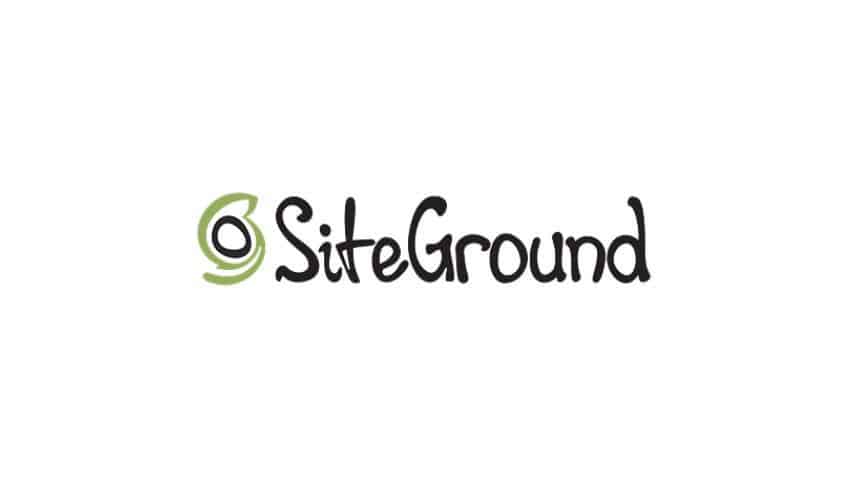
SiteGround has long been a favorite among agencies for speed, support quality, and simple client management. Its reseller offering is now package-based (replacing the old “credit” system) and built around Site Tools with white-label options for client access.
Core features across plans include: unlimited websites, a centralized dashboard, one-click WordPress installs, auto-updates, daily and on-demand backups, free SSL, CDN integration, professional email, staging, and unlimited databases.
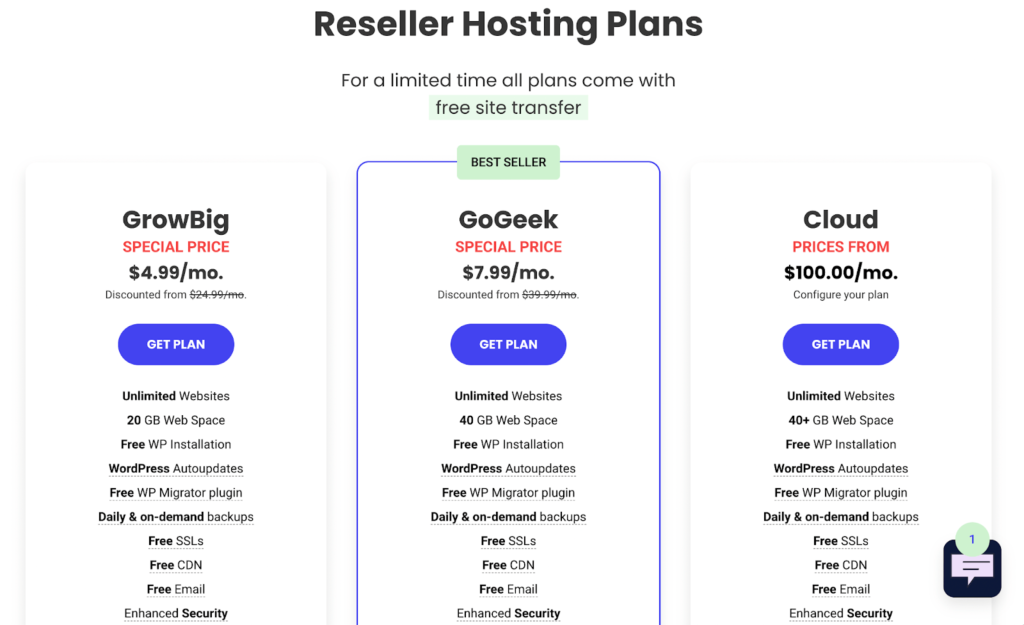
Agency-friendly perks: priority support on higher tiers, white-label client access, and a clean multi-site view that makes provisioning, staging, and hand-offs fast. If you outgrow shared resources, SiteGround’s cloud plans let you carve out custom packages per client.
Heads-up on operations: SiteGround doesn’t include built-in billing or domain reselling. Pair it with a billing platform (e.g., WHMCS) and a registrar for full white-label billing and DNS.
Bottom line: a polished experience and excellent support that scales with agencies. For details on performance and support, see our full SiteGround review.
InMotion Hosting – Best for starting a web hosting business
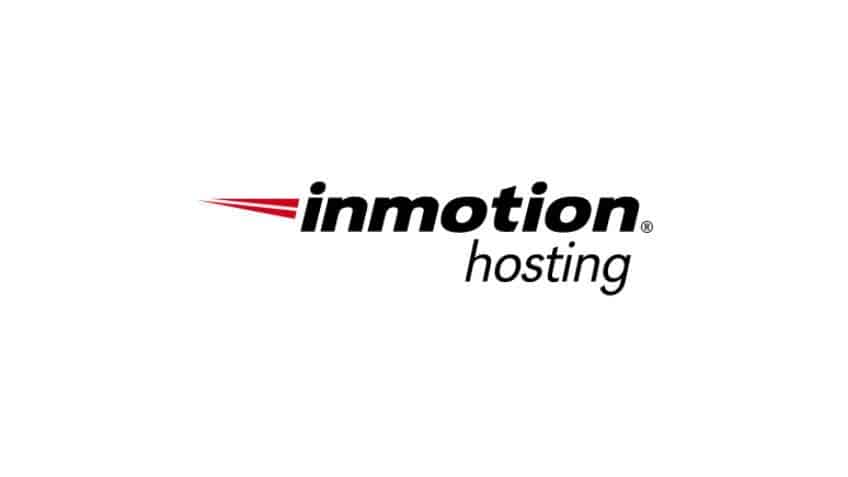
InMotion Hosting makes it easy to go to market quickly. Even entry-level reseller bundles typically include WHM and a WHMCS license so you can provision accounts, issue invoices, and automate renewals from day one.
Shared “R” packages are simple to run and great for first-time resellers; “VPS” packages deliver dedicated resources, root access, and more control for advanced setups. As you grow, plans step up storage, bandwidth, and the number of dedicated IPs.
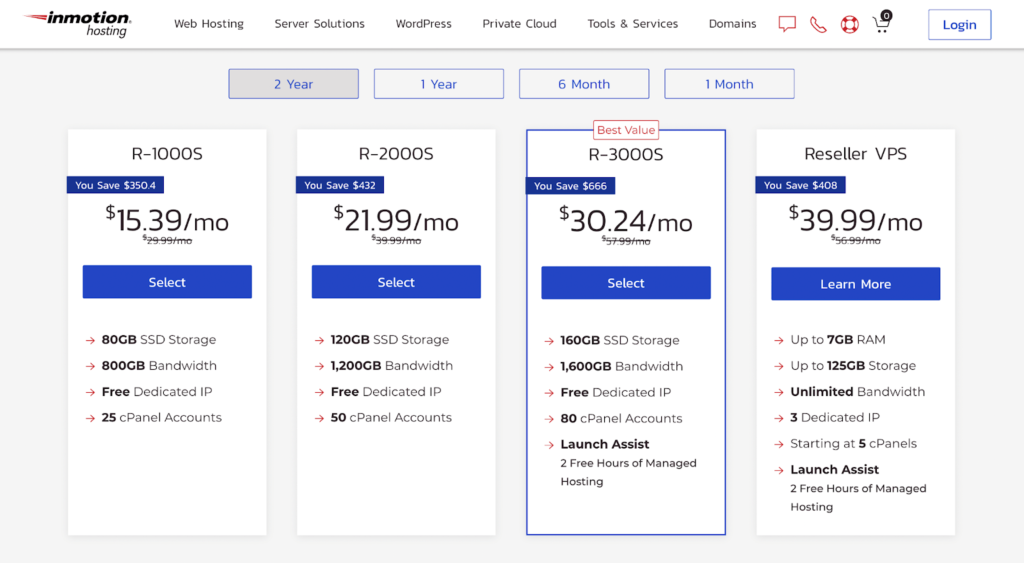
What stands out: free SSD storage, firewall/DDoS protection, malware defenses, white-labeling, and 24/7 support. InMotion also offers an extended money-back window on many plans, which lowers risk while you build your first client cohort.
If you’re new to reselling, start on an “R” plan to validate your packages and support model. If you need custom software stacks or stricter isolation, move to VPS as your client count and performance needs increase.
GreenGeeks – Best for developers who prioritize eco-friendly hosting

GreenGeeks matches its energy usage with renewable energy credits and invests beyond its own consumption, making it a strong fit for brands with sustainability goals.
Reseller plans are sold in manageable bundles (starting around 10 accounts) with the option to add more in small blocks as you grow. You get white-label tools, free SSL, WHMCS licensing on many tiers, free cPanel migrations, CDN integration, and nightly backups.
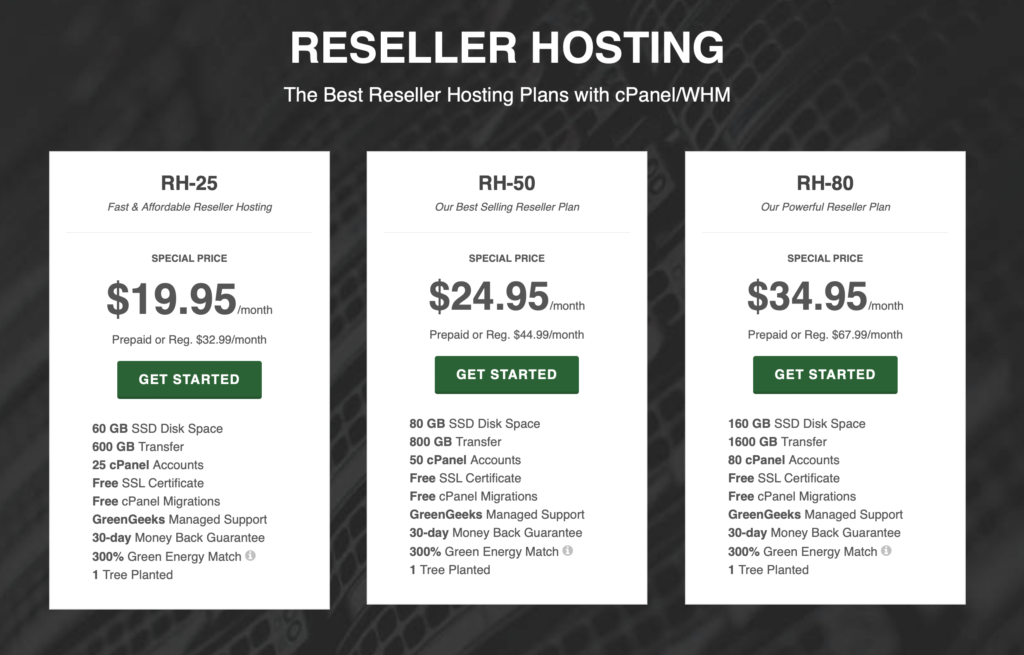
Developer conveniences include multiple PHP versions, WP-CLI, Git, and support for common stacks (including Perl and Python). 24/7 support and a standard money-back guarantee reduce risk while you align your hosting offer with eco-focused clients.
HostGator – Best for cost-effective reseller plans
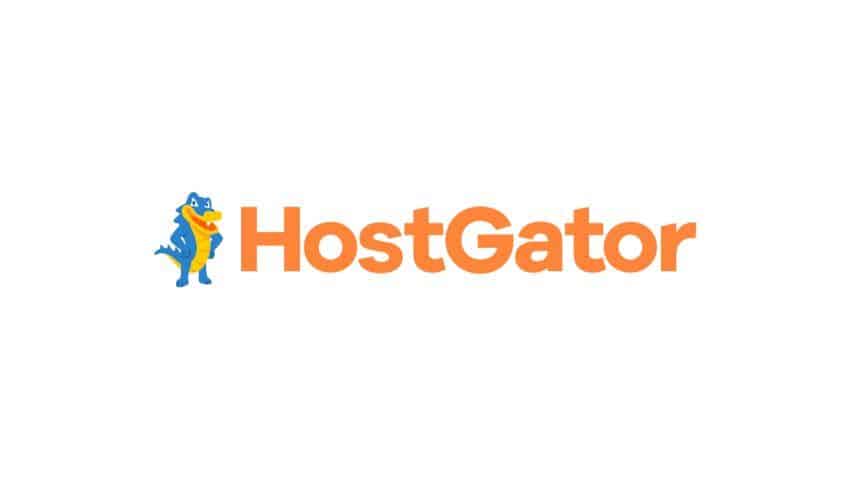
HostGator offers wallet-friendly reseller bundles with features that punch above their price—ideal for testing the waters or bundling hosting with small website projects.
You’ll typically get unlimited domains, free SSL, private name servers, email/FTP/MySQL accounts, WHM for account management, WHMCS billing, and 24/7 support. Promotional pricing is strongest on multi-year terms; renewal rates are higher, so plan your margins accordingly.
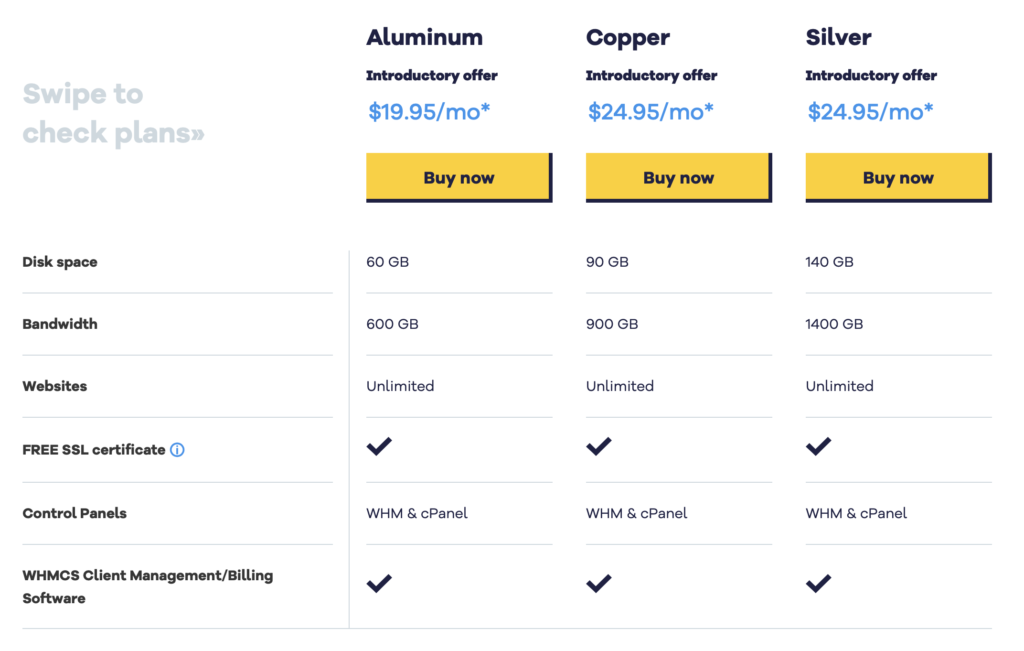
HostGator includes a 99.9% uptime guarantee and a 45-day money-back guarantee, giving you room to experiment with packaging before you commit to long terms.
If you’re migrating from another provider, look for transfer incentives—HostGator frequently discounts bulk transfers and domain registrations.
Liquid Web – Best for hands-off server maintenance
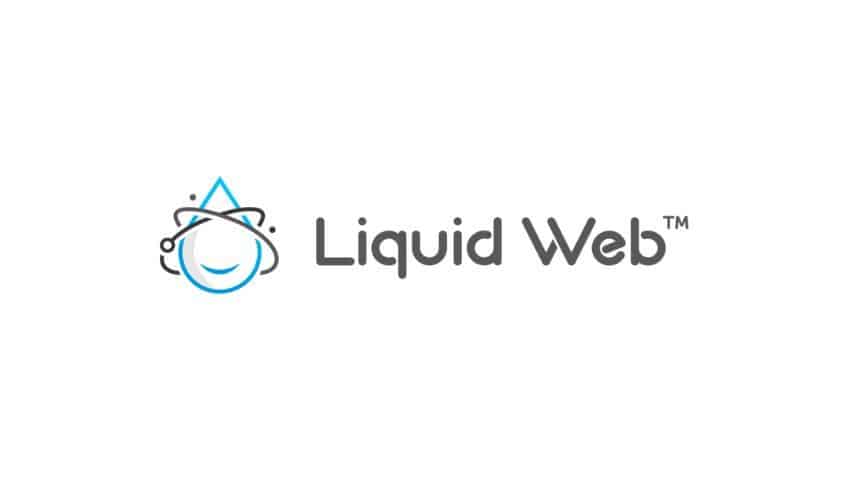
Liquid Web is a premium option with managed VPS and dedicated servers you can resell. It’s designed for agencies that want isolation, performance, and white-glove support without hiring a systems admin.
Expect fast provisioning, WHMCS integrations, proactive monitoring, and layered security (including DDoS defenses). Liquid Web’s 100% uptime SLA is among the strictest—if a provider-side outage occurs, you’re covered by service credits.
If your clients run revenue-critical sites, the managed stack and responsive support reduce firefighting and elevate your service level.
A2 Hosting – Best for scaling small-to-medium-sized client lists
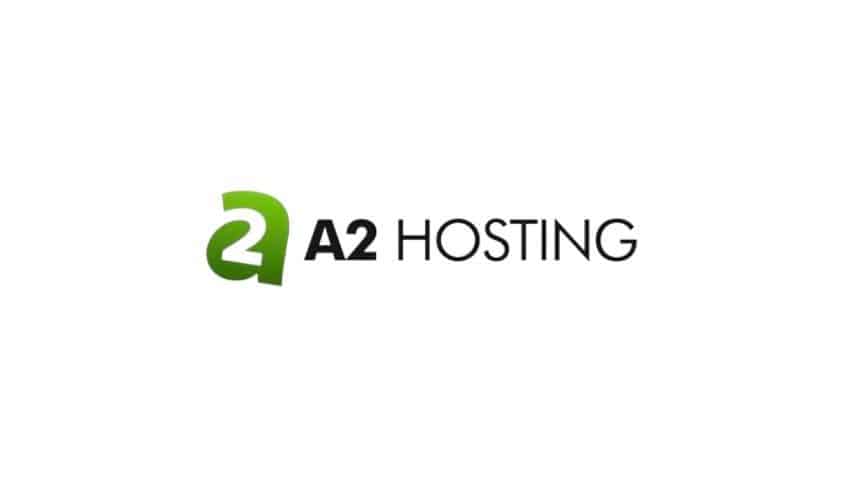
A2 Hosting is known for speed and developer-friendly defaults. Reseller tiers scale cleanly as you add accounts, and the Turbo plans use an optimized stack and NVMe storage to deliver noticeably faster page loads.
Entry bundles cover the basics, but most resellers should step up to a tier that includes WHMCS out of the box (or budget for an add-on) so you can automate signups, invoicing, and renewals. A2 backs plans with a 99.9% uptime commitment and responsive support.
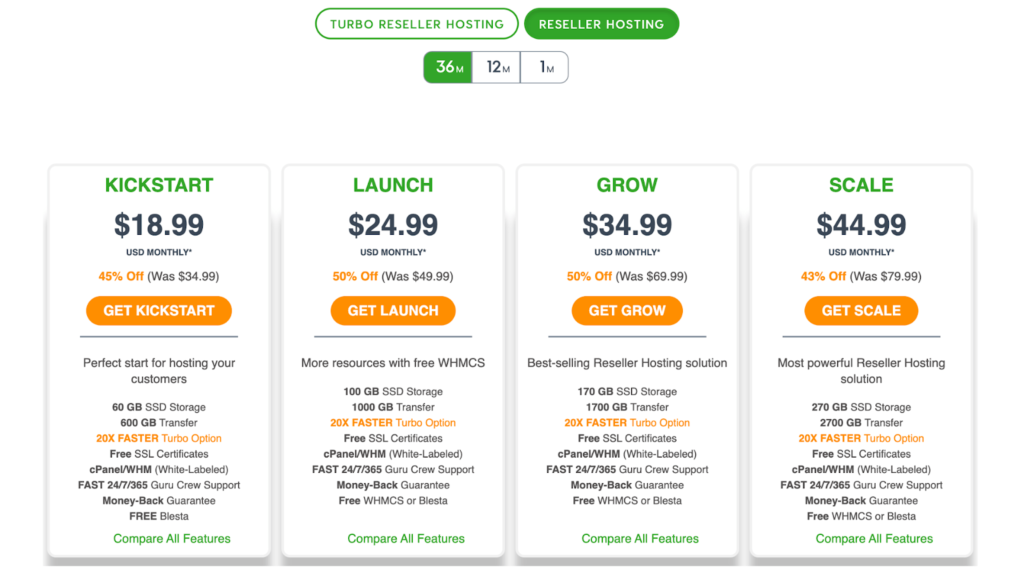
If performance is a selling point in your packages, lead with Turbo on your higher-priced plans to differentiate with speed, caching, and concurrency headroom.
What is Reseller Hosting?
Reseller hosting lets you sell hosting under your own brand while your upstream provider runs the infrastructure. You package disk space, bandwidth, mail, databases, and support into tiers—and you control pricing and margins.
It’s effectively white-label hosting: you manage customer relationships, billing, and first-line support; your provider maintains servers, networking, security patches, and platform reliability.
Because you buy at wholesale, you set retail prices that fit your market and bundle hosting with related services like site builds, maintenance, SEO, and content updates.
Who is Reseller Hosting For?
If you’re launching a single website and only need basic hosting, a standard shared or managed WordPress plan is simpler.
Reseller hosting shines for web designers, developers, marketers, and agencies managing multiple sites. It consolidates costs, centralizes management, and keeps clients with you long-term.
Entrepreneurs with tech-adjacent businesses (IT shops, MSPs, local computer stores) can also add hosting as a complementary recurring-revenue product.
As a rule of thumb, reseller hosting pays off when you’re managing ~10+ sites or expect steady growth. It also boosts retention—clients who host with you are far more likely to stay for ongoing services.
How to Choose a Reseller Hosting Provider (Checklist)
- Uptime and SLAs: Look for at least a 99.9% uptime commitment and transparent incident reporting.
- Performance stack: NVMe storage, modern PHP, HTTP/2 or HTTP/3, server-level caching, and a global CDN option.
- Security: Web application firewall, DDoS protections, malware scanning, automatic patching, and 2FA for control panels.
- Backups: Daily backups with easy restores; on-demand snapshots are a plus.
- White-labeling: Custom nameservers, branded panels, and no provider logos in client-facing portals.
- Billing: WHMCS or similar integration for automated signups, invoicing, and renewals.
- Email deliverability: SPF/DKIM/DMARC support, outbound rate limits, and guidance for avoiding blacklists.
- Scaling path: Ability to upgrade to VPS or cloud without painful migrations.
- Support model: 24/7 channels, escalation paths, and clearly defined what’s managed vs. your responsibility.
- Terms & renewals: Intro rates vs. renewal pricing, contract length, and refund windows.
How to Price Your Reseller Packages (Simple Math)
- Know your hard costs: Upstream plan + WHMCS/license + IPs + backups + any add-ons (e.g., malware cleanup).
- Set target margin: Many resellers aim for 60–80% gross margin on hosting alone.
- Bundle services: Include updates, monitoring, and monthly care time to raise perceived value and reduce churn.
- Create three tiers: Good/Better/Best with clear resource and support differences (storage, bandwidth, support response time, staging, backups).
- Annual incentives: Offer one or two months free on annual prepay to improve cash flow.
Client Onboarding & Migrations (Step-by-Step)
- Discovery: Collect DNS registrar, current host logins, site size, CMS/PHP version, email setup, and traffic patterns.
- Provision: Create the account in WHM, attach your branded nameservers, enable SSL and backups.
- Copy: Use your provider’s migration tools or cPanel transfers; test in staging before DNS cutover.
- Cutover: Lower TTLs, switch DNS, verify pages, forms, logins, and email routing.
- Handoff: Share a branded client portal, how-to docs, and your support SLAs.
Support & SLA Tips for Resellers
- Define first-line vs. upstream: You handle website/app issues; host handles platform/infra. Escalate cleanly.
- Offer clear response times: e.g., critical within 1 hour, normal within 24 hours.
- Document incidents: Keep a changelog and post-mortems—clients value transparency.
Reseller Hosting FAQs
- Can I use my own domain and nameservers? Yes—set up custom nameservers (ns1.yourdomain.com, ns2.yourdomain.com) for a fully branded experience.
- Who handles security? Your provider manages server-level security; you remain responsible for client-site security (plugins, themes, updates, hardening).
- What about email deliverability? Configure SPF, DKIM, and DMARC; avoid sending marketing blasts from shared mail servers.
- When should I move to VPS or cloud? Upgrade when clients need dedicated resources, custom stacks, or strict isolation, or when you hit resource ceilings.
Top Reseller Hosting Plans in Summary
Success with reselling starts with the right partner and a clear, value-packed offer. For most agencies, SiteGround delivers a polished management experience and strong support, while InMotion Hosting provides the fastest path to a fully branded offer with billing automation out of the box. If sustainability messaging matters, GreenGeeks leads with eco-friendly infrastructure; if you need premium performance and a strict uptime SLA, choose Liquid Web. Budget-sensitive? HostGator is hard to beat for entry pricing. Want speed as a differentiator? A2 Hosting is a strong pick.
Package hosting with maintenance and support, price it for margin, and standardize your onboarding. That’s the playbook for turning hosting into reliable, compounding revenue.
